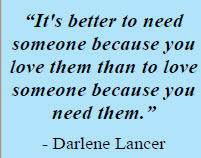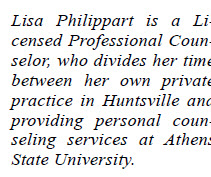Untying Codependency
 By: Lisa Philippart
By: Lisa Philippart
In my last article, we discussed the definition of codependency — understanding it roots, identifying its characteristics, and answering some questions to help identify codependent signs. Codependency is often thought of as a relationship problem and even considered by many to be a disease. The term was originally applied to relationships with those who struggled with addictions. I believe it is a relationship problem, but the relationship that’s the problem is not with someone else…it’s the one with yourself. That self-identity is what gets reflected in your relationship with others. If we can accept this premise, then codependency is the underlying cause of all addictions. The basic symptom of dependency is a reliance on someone else, a substance, or an activity (e.g. gambling). Instead of developing a healthy relationship with yourself, you make someone or something else more important. Unfortunately, over time, your thoughts, feelings, and actions revolve around that person, activity, or substance, resulting in increasingly abandoning your own relationship with yourself.

The codependency knot can be loosened and eventually even untied. Recovery requires a reversal of the unhealthy patterns in your life, leading to a reconnecting with your true self. Change is not easy and it takes time. The process begins with self-discipline. The goal is to bring attention back to yourself. By doing this, you reestablish internal vs external “locus of control.” Your actions become motivated by your values, your needs, and your feelings…not someone else’s. You learn to meet your needs in healthy ways. In relationships, it is almost impossible to completely separate because you depend on others and are required to compromise. But you can learn to detach and not control, become less of a people-pleaser, or diminish obsessing about others. Self-discipline will allow you to become more self-directed and independent.

Denial is the trademark of addiction. This is true whether you are an alcoholic or in love with one. Codependents deny their own addiction, whether it’s to a drug, an activity, or a person. They deny their feelings and needs, especially their emotional needs for nurturing and intimacy. This step requires self-awareness. You may have grown up in a family where your feelings and opinions weren’t respected, and your emotional needs weren’t met. Over time, you learned to ignore these feelings and needs rather than risk blame or rejection. This leads to low-self-esteem. In order to reverse these damaging habits, you must first become aware of them. Negative self-talk is the most harmful obstacle to self-esteem. You may not even be aware of the internal voices which degrade and criticize. Words are actions. Your thoughts have power and reflect your self-esteem.

Almost any type of healing involves self-acceptance. This is not only a step but a lifelong journey. Before you can change, you have to accept both yourself and your situation. Have you heard the phrase, “What you resist, persists?” As you travel on your life journey, more about yourself, your limitations, and your losses is revealed which requires your acceptance. This is often called maturity. Once you accept reality, the doors of possibility open and change can happen. No longer do you self-blame or fight the truth. For example, when you feel sad or lonely, instead of making yourself feel worse, you learn self-compassion and self-soothing techniques. You learn that you don’t have to please everyone. Treating yourself well allows you to be self-reflective without being self-critical. As your self-esteem and self-confidence grow, you become more authentic and assertive. You are becoming you.
Acceptance without action will only get you so far. The next step requires new behaviors and action. This involves venturing outside your comfort zone by speaking up, trying something new, going someplace different, setting a boundary, saying “no” to your self-critic, or changing unhealthy habits. Instead of expecting others to meet your needs or make you happy, you learn to take actions to meet them. Every time you try out something new or take a risk, you learn something about yourself, your feelings, and your needs. By creating a stronger sense of yourself, you build self-confidence and self-esteem. And this builds upon itself in a positive response loop instead of the downward spiral of codependency of fear, depression, and low self-image. It’s time to respect and honor yourself and who you really are. You can become the author of your life.
By: Lisa Philippart
Licensed Professional Counselor